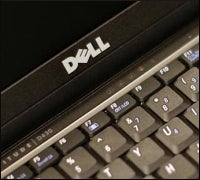 |
| Source: Reuters |
Two of the biggest computer vendors, Dell and Ingram Micro, warned on Tuesday that demand was weakening, adding to worries that the crisis on Wall Street would hurt corporate and consumer spending.
While neither company mentioned the financial sector specifically, they were the first major U.S. technology companies to warn investors since a series of financial shocks in recent days. Lehman Brothers (NYSE: LEH) collapsed, Merrill Lynch (NYSE: MER) is being taken over and insurer American International Group (NYSE: AIG) is fighting for its survival.
Furthermore, analysts expect bleak outlooks for the December quarter.
“It sounds like things are really starting to slip everywhere. Both consumer and corporate end-demand are slowing. The question is how long it lasts,” said Cross Research analyst Shannon Cross.
“Dell and others in the industry have exposure to the financials, and that impacted them,” she said. “When you see these failures on Wall Street and the concerns that people have about banks, I think it does cause people to pull back a little on their spending.”
Tech shares fell broadly on Tuesday morning, with Dell losing 10 percent and Ingram Micro (NYSE: IM) down 4 percent. Business software maker VMware (NYSE: VMW) fell 9 percent and computer memory chip maker Micron Technology (NYSE: MU) plunged 12 percent.
Dell (NASDAQ: DELL), the second-largest maker of personal computers behind Hewlett-Packard Co (NYSE: HPQ), already posted a steep drop in fiscal second-quarter profit and said in August that customers were holding back on purchasing decisions.
“The company is seeing further softening in global end-user demand in the current quarter,” Dell said in a brief statement on Tuesday, ahead of a presentation at a Bank of America investment conference later in the day.
Dell expects to incur costs to “improve competitiveness,” reduce headcount and invest in infrastructure and acquisitions, but gave no specific financial forecasts.
Ingram Micro, the world’s biggest computer products distributor, cut its third-quarter profit and revenue outlook, saying economic softness in the summer was continuing into September and pressuring operating margins.
“In Europe, we are not seeing the typical September bounce back from the summer holidays. North America seemed to be relatively stable in the summer months, but we’re experiencing broad-based softness in September,” Ingram Micro Chief Executive Gregory Spierkel said in a statement.
Accelerating weakness
Analysts said Ingram Micro, which distributes electronic products such as PC components, printers and cables, was more focused on small and medium businesses, and therefore less directly vulnerable to the banking sector crisis than Dell and companies like data storage equipment maker EMC (NYSE: EMC).
“It’s been known for sometime that the financial sector is a weak sector. On the other hand, what we’ve seen over the last few weeks is that the weakness is accelerating,” said Shebly Seyrafi, an analyst with Calyon Securities.
“If you look at something like EMC, for example, they typically derive about 15 to 20 percent of revenue from the financial sector. A lot of other companies derive similar percentages. So it’s a rather large sector and if the weakness there accelerates, it could bode negatively, incrementally, for the next six months.”
Another company in the storage space, Seagate Technology (NYSE: STX), said poor visibility about where the economy was heading was causing people to pull back spending plans.
“Right now people are uncertain about the credit [market], are uncertain about oil prices,” Seagate Chief Executive Bill Watkins told Reuters in an interview.
Dell is “much more in tune to small businesses — that’s where they sell a lot of their stuff — and I’m sure that market is tough,” he said, noting that more consumer-focused companies such as Apple (NASDAQ: AAPL) could do better.
Analysts also said that Dell’s news might not be so negative for its biggest rival, HP.
“We think HP is well positioned to outperform given its diverse product lineup and ability to leverage the EDS channel for incremental sales,” Cross said.
HP said on Monday it would cut 24,600 jobs, or 7.5 percent of its workforce, seeking to realize cost savings from its acquisition of computer services provider Electronic Data Systems.


